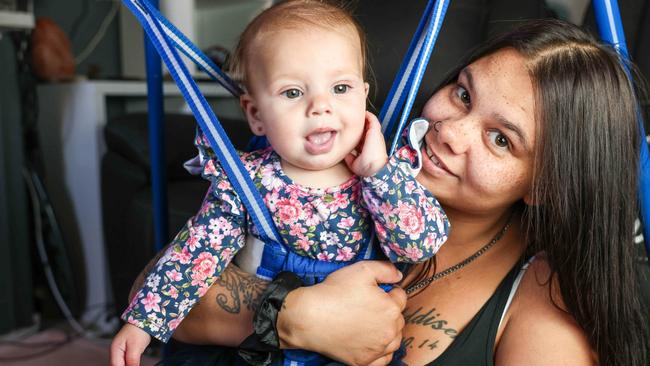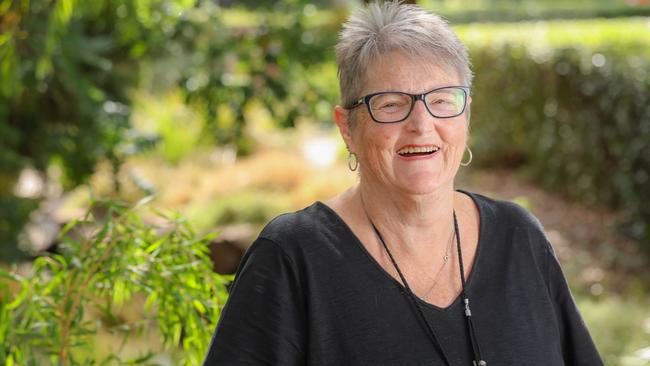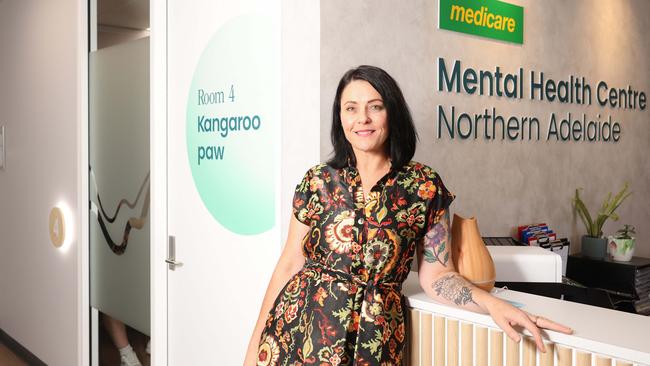New care centres are making the health of South Australians a priority
Priority Care Centres provide vital community-based healthcare and treatment for eligible patients.

SA News
Don't miss out on the headlines from SA News. Followed categories will be added to My News.
It is every mother’s worst nightmare when their newborn baby has difficulty breathing.
For 27-year-old mother-of-three Talisha Wagner, it became reality when faced with her five-month-old daughter Paisley struggling to breathe.
Calling the healthdirect helpline, Wagner was advised to immediately head to hospital or the Elizabeth Medical and Dental Centre, where she could access urgent care services for her daughter.
Paisley was then referred to and treated at the Elizabeth Priority Care Centre, a centre her mum was previously unaware of.
Faced with a daunting wait in a hospital emergency department, she chose to try the clinic, where the young family was in and out in 90 minutes armed with a diagnosis and the information necessary to tackle the problem facing the newborn.
“It’s happened before and we have taken her to the hospital – twice,” Wagner explains.
Paisley’s condition – known as laryngomalacia – is caused by floppiness of the laryngeal tissues above the vocal cords.
When breathing in, the tissues above the vocal cords fall in towards the airway, causing partial obstruction.
The doctor quickly diagnosed the issue, which Paisley will eventually grow out of as she gets bigger and her muscles become stronger.
“They taught me different ways for her to swallow to kind of bring it back,” Wagner says.
“It was really great as they showed me what to do in the event it happens again.
“Now she wears a sock monitor so I can keep a close eye on it.”
SA Health, in partnership with the Adelaide Primary Health Network and general practices, established four Priority Care Centres across metropolitan Adelaide in Marion, Elizabeth, Para Hills West and Hindmarsh, with an additional centre located in Mount Barker.
These centres provide vital community-based healthcare and treatment for eligible patients such as Paisley and her mother with urgent but non-life-threatening conditions who would otherwise be seeking treatment at a hospital emergency department.
The referral-based centres can also provide a range of other services including radiology, pathology and pharmacy services, and can refer on for follow-up care.
Patients who are eligible for Medicare can also access a Priority Care Centre at no cost.
Talisha Wagner is a big advocate for the centres. “Absolutely, they were amazing,” she says. “It’s not as chaotic as an emergency department and from my experience I think they have more time to be thorough and you’re not having to wait around for hours on end to get the help you need.”
New service is a breath of fresh air to consumers

When Carolyn Ohijenko was having difficulty breathing, the 70-year-old feared yet another trip to the emergency department and the potential of a lengthy wait.
Recently diagnosed with asthma, Ohijenko was having problems managing her breathing along with her medications, when ambulance officers were called to her home.
Upon assessment they made a call to the SA Health Urgent Care Hub-Playford clinic, a new, dedicated out-of-hospital healthcare service, next door to the Lyell McEwin Hospital.
Part of the SA Health Urgent Care Hubs, these referral-only services provide various, rapid assessments and acute care for patients whose care needs are unable to be met by primary care providers and would otherwise need to visit an emergency department.
After spending up to 18 hours in departments in the past, Ohijenko was blown away by the speed and care she received at the Urgent Care Hub.
“I’m new to having experiences of bronchial asthma and after my first episode which took me to emergency, I was very scared,” she explains.
“I would have these coughing spasms and despite having the medications, they didn’t seem to be working. The second time the ambulance came to my home – they were the ones who rang the new hub, which I found very fascinating.”
Just a week earlier in mid-March, Ohijenko had similar breathing problems and was taken to an emergency department. She says the experience at the hub was much smoother and more comfortable.
“I was very impressed with the whole area, the medical staff and how well they looked after me,” she says. “It was very attentive and immediate. I didn’t have to sit in a plastic chair and wait to see someone. As an older person that is very uncomfortable. The people were looking after me from the moment I entered the place and they had all my complete medical history in front of them and could look after me straight away.”
Located in Sefton Plaza, Woodville, Playford (Elizabeth) and Daw Park, the SA Health Urgent Care Hub multidisciplinary teams are made up of nurses, nurse practitioners, doctors, physiotherapists, pharmacists, social workers, podiatrists, occupational therapists and dietitians. It is a referral-only service, received from SA Ambulance Service, SA Virtual Care Service, general practitioners and community health care providers, while non-government organisations or consumers can even be redirected from emergency departments.
Ohijenko says these hubs take some of the strain off our emergency departments. “For us older people, we have complex issues, so sometimes we don’t have a choice but to make an emergency call,” she explains.
“I would 100 per cent use the services again. They did everything they could for me, from showing me how to use the medications properly to making recommendations to my local GP. They were great.”
Been there, lived that

Jess Rolevink speaks with authority about the crucial role peer support plays in helping people deal with their mental health challenges.
As the peer practice lead at the Northern Adelaide Medicare Mental Health Centre, she sees every day the impact empathy and understanding from people with lived experience has on those who may be struggling with issues such as extreme anxiety and depression.
And she only wishes the service – designed to help give people the care they need when they need it to keep them out of hospitals – existed when she was dealing with her own distress.
“During my teenage years and my twenties, I really struggled with anxiety and depression quite badly,” she says. “It was so hard to get help. I was in and out of hospitals. “That was it back then – there was no such thing as valuing lived experience. For me, my experience was one of isolation and of feeling judged. There was no one there that could say to me, ‘you know what Jess, I get it. I absolutely get what you’ve been through and you’re going to be OK’.
“I never experienced that and so this is why this role is so important. It just helps so much.” Rolevink works with a team of 25 peer support workers and a similar number of clinicians at the walk-in Elizabeth centre, described as “a welcoming place for people to access mental health information, services and supports from qualified professionals over extended hours.”
Anyone can reach out for support for themselves, a loved one, friend, colleague or community contact. The service is free and no appointment, referral or Medicare card is needed. Similar centres are in Adelaide, Mount Barker, Mount Gambier and Port Pirie.
Northern Adelaide Medicare Mental Health Centre operations lead Rebecca Ljubic says all five centres are tailored to meet the needs of their local communities. “When people experience a mental health crisis or distress they often turn to a hospital and emergency department and that’s not always the best fit, given EDs are really tailored for physical health needs, and not so much mental health needs,” she says.
The service aims to – where appropriate – provide immediate support to reduce distress; provide in-house assessment, treatment and support; and connect people with the most appropriate ongoing support.
Ljubic says the focus is on providing a “warm and welcoming” space, far removed from a cold, clinical setting.
“There’s a lounge room environment for people, all the consulting rooms are very low stimulus, there’s mood lighting,” she says. “It’s relaxed and comforting to help support people in a homelike, relaxing sort of environment.”
There has been growing local demand for the service.
“For our immediate access – the walk-in component of our service – we are currently seeing more than 300 people a month. And that’s just stepping up and up and up each month.” Ljubic agrees the “peer-first” lived experience component of the service helps provide a balanced and holistic care model.
“A lot of people come into the service feeling distressed, in crisis and hopeless but having that peer connection – having someone there who believes in them – helps them to regain some of that hope,” she says.
“Not everyone requires clinical intervention either. Some people might come in and they’ll be able to talk with a peer and talk it through.
“Some may come in and might have some very serious things happening in their life where safety is concerned. That’s where a clinician will become involved and provide some support around some of those more complex situations.”
Rolevink says hearing others talk about their own lived experience in a “purposeful and authentic way” can have a powerful effect – and reflects again on the lack of post-hospital care during her own mental health journey.
“What I would have loved back then would have been a combination – someone with lived experience and someone with the clinical know-how to essentially walk alongside me. And that’s what we do here.”
The Northern Adelaide Medicare Mental Health Centre, at 23 Gillingham Rd, Elizabeth, is open 8.30am to 10.30pm on weekdays and noon to 6.30pm on weekends and public holidays. Details: medicaremental health.gov.au


